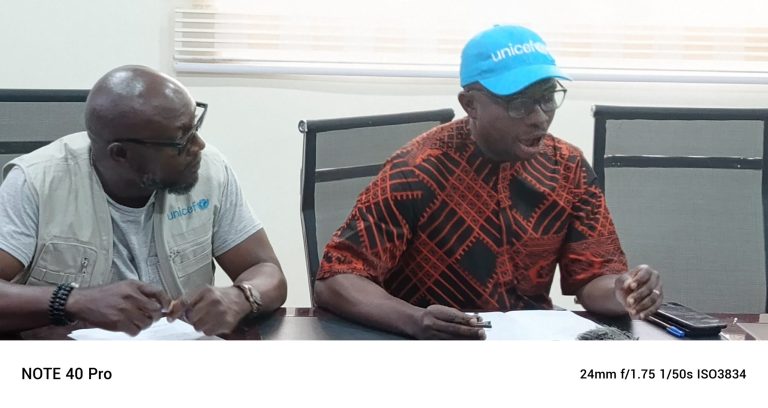Over 3 million children aged between 9 and 59 months are set to be vaccinated against measles across four states: Plateau, Gombe, Bauchi, and Adamawa under the Bauchi Field Office of the United Nations Children’s Fund (UNICEF).
This announcement was made by Patrick Akor, a Health Officer with UNICEF, during a joint press briefing held at the UNICEF Office in Bauchi on Friday. He stated that the campaign will begin on Saturday, November 2, 2024.
He also shared that the measles vaccines, totaling 4 million doses, have already been distributed across the four states under the Field Office. For the Oral Polio Vaccination, the target is 6,815,691 children aged 0 to 59 months, which is under five years of age.
Akor emphasized that 7,473,450 doses of the Oral Polio Vaccine have been provided to five states and will be administered to eligible children under five years old.
He explained that for the integrated measles campaign, four states—Plateau, Bauchi, Gombe, and Adamawa—will also be implementing other antigens, including the Polio vaccine, while Taraba will be focusing on the Oral Polio Vaccination.
ALSO READ: Ebonyi: Police parade suspected organ harvesters, kidnappers, others
He stated, “So we have four states implementing the integrated campaign. We are working with the governments to make this a huge success.”
“For the last few months, UNICEF, along with other partners, has been collaborating with governments from the national level through the National Primary Healthcare Development Agency down to state agencies. We’ve been working closely to ensure all aspects of the campaign are covered,” he added.
“UNICEF has provided logistics support to the states, meaning vaccines are readily available across all states for the campaign. Additionally, UNICEF has supplied commodities, including a cold chain system for vaccine storage,” Akor said.
He highlighted UNICEF’s support in managing the vaccines’ transportation from the manufacturer to the country and to the states.
“For the measles campaign, we expect a post-campaign survey to verify that up to 95 percent of eligible children were vaccinated,” he stated. “We urge the media to help the community understand the importance of vaccination to prevent measles and reduce mortality and morbidity rates in the country.”
He added, “We are starting on Saturday, November 2, and the measles vaccination will run for five days, while the Oral Polio Vaccination will last for four days. A mop-up period of six to seven days will ensure every child is reached, wherever they are in the communities.”
ALSO READ: Ebonyi: Police parade suspected organ harvesters, kidnappers, others
Speaking earlier, George Eki, a Social Behavioural Change (SBC) Specialist, noted, “As my colleague mentioned, we are beginning the integrated measles campaign across the country, especially in the northern states, which includes the administration of measles and other vaccines over the next week.”
Eki explained, “This campaign is essential due to past shortcomings in our coverage. The last measles campaign in 2022 showed we did not reach our target of 95 percent, leaving measles as a significant threat to children, causing mortality, blindness, and other serious health conditions.”
The SBC Specialist emphasized, “It has become necessary for governments, with support from UNICEF and other UN agencies, to ensure children, even in remote or security-compromised areas, are protected against measles and other preventable diseases.”
He added that UNICEF and its partners have worked with the government from the national level through the National Primary Healthcare Development Agency and state agencies to cover all aspects of the campaign.
“We have provided logistical support to ensure vaccines are available across all campaign states,” he said. “UNICEF has also provided essential commodities, including a cold chain system for vaccine storage.”
“Moreover, Advocacy Communication and Social Mobilization, a core UNICEF mandate, is underway to inform the public about the campaign schedule, age eligibility, and vaccine locations,” he added.
“We’ve engaged various community leaders, including traditional, religious, and educational leaders, because we know many children eligible for these vaccines are school-aged,” he explained.
Eki added, “Teachers and the Ministry of Education are actively involved to ensure children bring the information home. Through PTAs, parents are informed about the campaign since vaccination teams will be visiting schools.”
He stressed, “We aim to prevent cases where children or parents are unaware of the vaccination. To raise awareness, radio programs and jingles have been running for the past few weeks. We hope to achieve 85 percent coverage across all states.”
“We’re also supporting state vaccination teams with transportation and logistics to reach all communities. Media support is provided to monitor and ensure trained health workers are equipped for the vaccination period,” he added.
Eki highlighted zero-dose challenges, explaining, “In Bauchi, for example, 13 local governments have reported zero-dose cases. Throughout this year, we’ve seen outbreaks, including in Gombe with meningitis cases, largely because children are not fully vaccinated. This campaign aims to protect every child against vaccine-preventable diseases.”
He said, “Apart from polio, routine vaccines will be available during the campaign. When children come for the measles vaccine, they may also receive other missed routine immunizations at field posts and through house-to-house visits.”
Eki concluded, “This integrated campaign will address zero-dose children across UNICEF’s Bauchi Field Office.”
